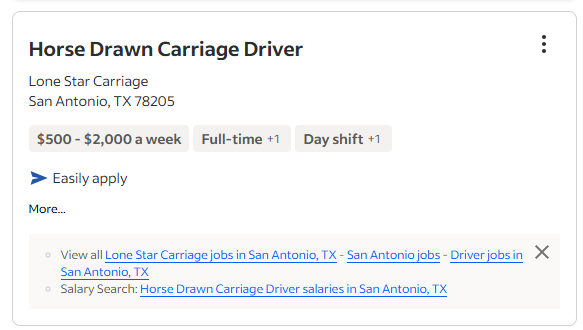I've been hearing this expression at conferences such as ConVEx 2025:
"AI won't replace your job. Someone who knows how to use AI will replace your job."
This is a good point for everyone to keep up with technology, their skills, and the latest in AI capabilities.
The role changes are not a complete replacement, but rather there we're seeing new roles and jobs. Perhaps the number of people in each role will change. As an example, "go the way of the horse and carriage" is an idiom that suggests something has gone obsolete. However, there are still some jobs for horse drawn carriages on Indeed.com.

In localization, the machines or even the software didn't replace all translators. I had a friend outside of work that recognized Trados Studio as translation software but didn't use it herself. Even in processes that involve machine translation, humans may be involved in adjusting desktop files (desktop publishing), managing the project, or translating after translation memory and machines have made a first pass at the translation segments. Read my post on the cost of translations for a bit more context on the process for content champions, with the caveat that I'm familiar with translation from a business architecture, content supply chain perspective, and even product integration perspectives, but I don't have the personal background in it.
And if we look at roles in localization includes people who translate content often, but not always with computer assisted translation (CAT) tools. Translators might focus on editing content that is already translated in a step called post-editing and there's a lot of content or digital files that require desktop publishing to manipulate files. And even as we see how AI could refine automatic post editing through private LLMs, there are still people involved in the content supply chain.
As another example, in Web development, there was a time when it seemed we just had webmasters, who were responsible for managing websites down to hand-coded HTML files. But over time, the roles and specialties grew and grew, to where you have roles and supporting technology for:
- Frontend and backend development
- Architects
- Operations, infrastructure, and cloud-related roles
- Content and/or technical writers
- Content operations
- Project managers
- Product owners, product managers, (product) platform owners
Even customer experience, user experience, and user interface are slightly different aspects of what customers experience with even more focuses in each of these roles (e.g., designers and researchers).
AI may consume content you create, but it cannot replace the ultimate humans than need content, even if the content supply chain itself is augmented or assisted by AI.
What do you think about AI's role in content-related work? Is AI already part of your job? Will the next generation of workers actually be Generation AI, the Gen AI natives similar to the digital natives before them?
Join Content Champions to leave a welcome comment below, otherwise see my original post about AI and content-related job roles on Linked-In if you want to have a more public conversation.

 Translate
Translate
